Ethical Dilemmas in Nursing: RN Sam Case Study Evaluation
VerifiedAdded on 2022/10/18
|6
|2043
|8
Case Study
AI Summary
This case study delves into the ethical and legal complexities faced by RN Sam, focusing on a scenario involving a pregnant minor, Jessica, who confides in the nurse but wishes to keep her condition private. The assignment analyzes the ethical dilemma RN Sam faces, weighing the minor's right to confidentiality against the potential need to inform her parent. It explores the application of ethical principles such as autonomy and beneficence, as well as legal considerations regarding patient privacy and adolescent healthcare. The case study examines the ICN Code of Ethics, offering two potential courses of action for RN Sam: upholding Jessica's confidentiality or encouraging her to share the information with her mother and referring her to counseling. The author reflects on these options, ultimately advocating for a solution that balances the need for confidentiality with the importance of parental support and professional guidance, emphasizing the value of counseling to address the psychological and emotional impact of the situation and maintaining a supportive parent-child relationship. The assignment utilizes references to support the arguments and conclusions.

UNIT:
NAME:
TUTOR:
NAME:
TUTOR:
Paraphrase This Document
Need a fresh take? Get an instant paraphrase of this document with our AI Paraphraser
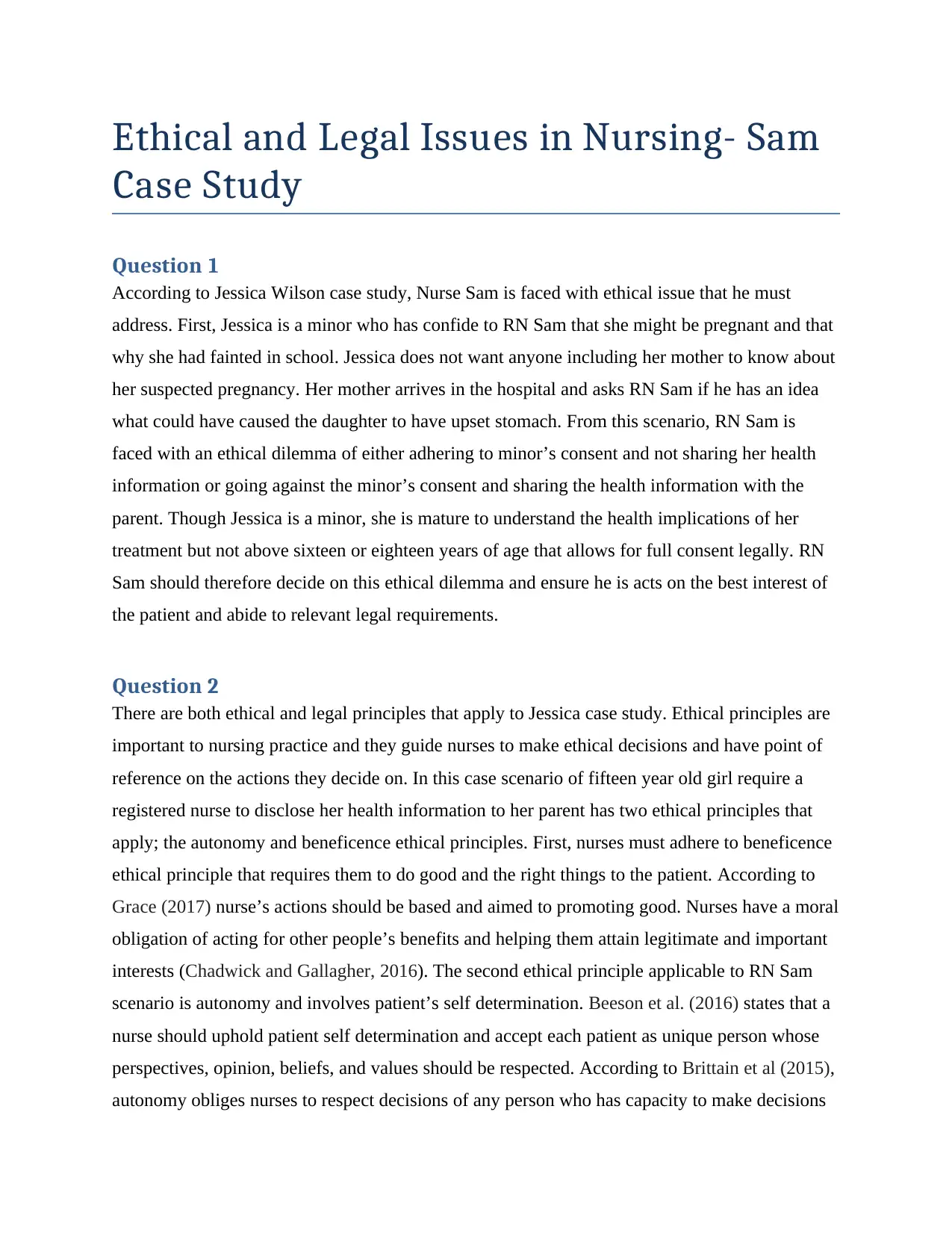
Ethical and Legal Issues in Nursing- Sam
Case Study
Question 1
According to Jessica Wilson case study, Nurse Sam is faced with ethical issue that he must
address. First, Jessica is a minor who has confide to RN Sam that she might be pregnant and that
why she had fainted in school. Jessica does not want anyone including her mother to know about
her suspected pregnancy. Her mother arrives in the hospital and asks RN Sam if he has an idea
what could have caused the daughter to have upset stomach. From this scenario, RN Sam is
faced with an ethical dilemma of either adhering to minor’s consent and not sharing her health
information or going against the minor’s consent and sharing the health information with the
parent. Though Jessica is a minor, she is mature to understand the health implications of her
treatment but not above sixteen or eighteen years of age that allows for full consent legally. RN
Sam should therefore decide on this ethical dilemma and ensure he is acts on the best interest of
the patient and abide to relevant legal requirements.
Question 2
There are both ethical and legal principles that apply to Jessica case study. Ethical principles are
important to nursing practice and they guide nurses to make ethical decisions and have point of
reference on the actions they decide on. In this case scenario of fifteen year old girl require a
registered nurse to disclose her health information to her parent has two ethical principles that
apply; the autonomy and beneficence ethical principles. First, nurses must adhere to beneficence
ethical principle that requires them to do good and the right things to the patient. According to
Grace (2017) nurse’s actions should be based and aimed to promoting good. Nurses have a moral
obligation of acting for other people’s benefits and helping them attain legitimate and important
interests (Chadwick and Gallagher, 2016). The second ethical principle applicable to RN Sam
scenario is autonomy and involves patient’s self determination. Beeson et al. (2016) states that a
nurse should uphold patient self determination and accept each patient as unique person whose
perspectives, opinion, beliefs, and values should be respected. According to Brittain et al (2015),
autonomy obliges nurses to respect decisions of any person who has capacity to make decisions
Case Study
Question 1
According to Jessica Wilson case study, Nurse Sam is faced with ethical issue that he must
address. First, Jessica is a minor who has confide to RN Sam that she might be pregnant and that
why she had fainted in school. Jessica does not want anyone including her mother to know about
her suspected pregnancy. Her mother arrives in the hospital and asks RN Sam if he has an idea
what could have caused the daughter to have upset stomach. From this scenario, RN Sam is
faced with an ethical dilemma of either adhering to minor’s consent and not sharing her health
information or going against the minor’s consent and sharing the health information with the
parent. Though Jessica is a minor, she is mature to understand the health implications of her
treatment but not above sixteen or eighteen years of age that allows for full consent legally. RN
Sam should therefore decide on this ethical dilemma and ensure he is acts on the best interest of
the patient and abide to relevant legal requirements.
Question 2
There are both ethical and legal principles that apply to Jessica case study. Ethical principles are
important to nursing practice and they guide nurses to make ethical decisions and have point of
reference on the actions they decide on. In this case scenario of fifteen year old girl require a
registered nurse to disclose her health information to her parent has two ethical principles that
apply; the autonomy and beneficence ethical principles. First, nurses must adhere to beneficence
ethical principle that requires them to do good and the right things to the patient. According to
Grace (2017) nurse’s actions should be based and aimed to promoting good. Nurses have a moral
obligation of acting for other people’s benefits and helping them attain legitimate and important
interests (Chadwick and Gallagher, 2016). The second ethical principle applicable to RN Sam
scenario is autonomy and involves patient’s self determination. Beeson et al. (2016) states that a
nurse should uphold patient self determination and accept each patient as unique person whose
perspectives, opinion, beliefs, and values should be respected. According to Brittain et al (2015),
autonomy obliges nurses to respect decisions of any person who has capacity to make decisions
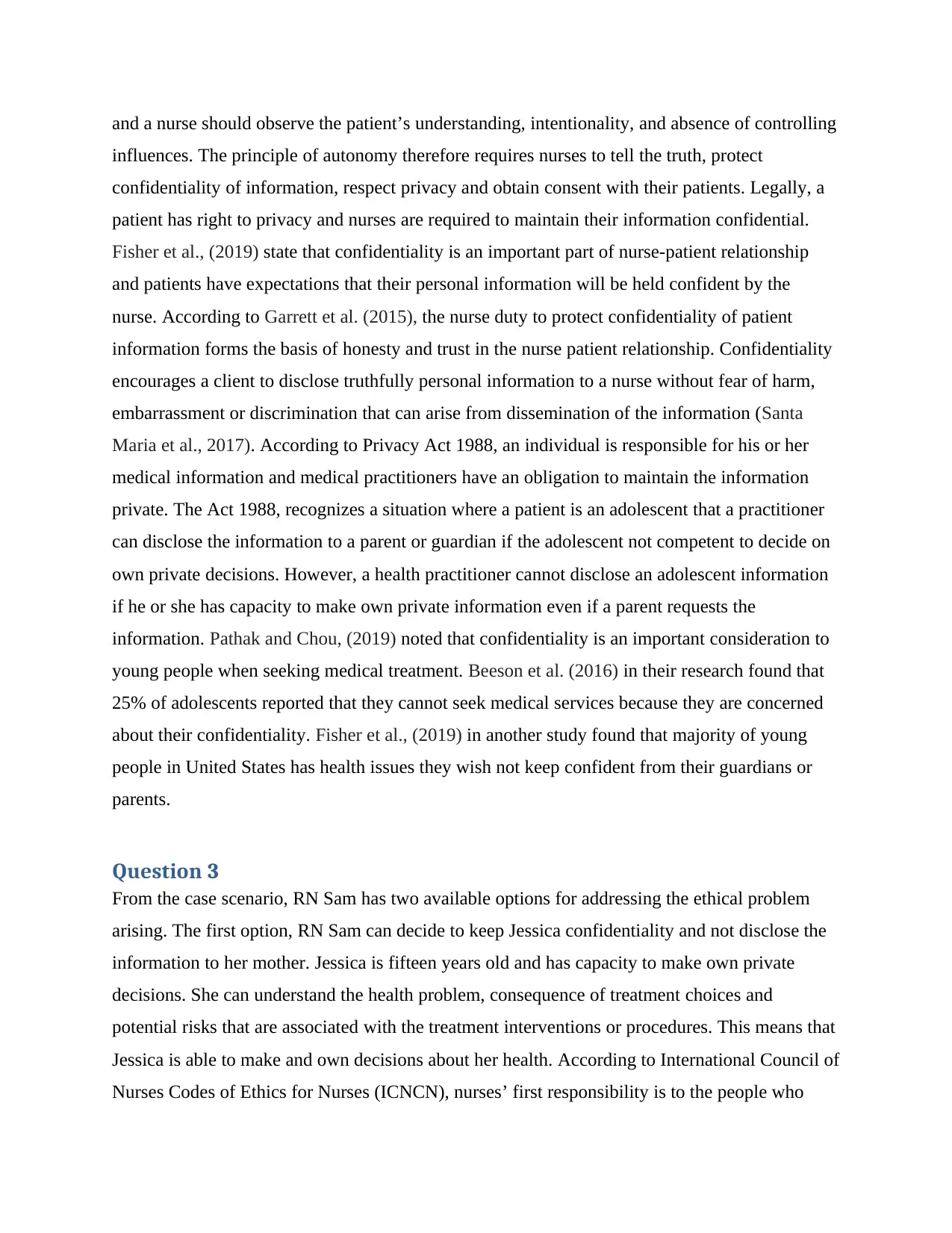
and a nurse should observe the patient’s understanding, intentionality, and absence of controlling
influences. The principle of autonomy therefore requires nurses to tell the truth, protect
confidentiality of information, respect privacy and obtain consent with their patients. Legally, a
patient has right to privacy and nurses are required to maintain their information confidential.
Fisher et al., (2019) state that confidentiality is an important part of nurse-patient relationship
and patients have expectations that their personal information will be held confident by the
nurse. According to Garrett et al. (2015), the nurse duty to protect confidentiality of patient
information forms the basis of honesty and trust in the nurse patient relationship. Confidentiality
encourages a client to disclose truthfully personal information to a nurse without fear of harm,
embarrassment or discrimination that can arise from dissemination of the information (Santa
Maria et al., 2017). According to Privacy Act 1988, an individual is responsible for his or her
medical information and medical practitioners have an obligation to maintain the information
private. The Act 1988, recognizes a situation where a patient is an adolescent that a practitioner
can disclose the information to a parent or guardian if the adolescent not competent to decide on
own private decisions. However, a health practitioner cannot disclose an adolescent information
if he or she has capacity to make own private information even if a parent requests the
information. Pathak and Chou, (2019) noted that confidentiality is an important consideration to
young people when seeking medical treatment. Beeson et al. (2016) in their research found that
25% of adolescents reported that they cannot seek medical services because they are concerned
about their confidentiality. Fisher et al., (2019) in another study found that majority of young
people in United States has health issues they wish not keep confident from their guardians or
parents.
Question 3
From the case scenario, RN Sam has two available options for addressing the ethical problem
arising. The first option, RN Sam can decide to keep Jessica confidentiality and not disclose the
information to her mother. Jessica is fifteen years old and has capacity to make own private
decisions. She can understand the health problem, consequence of treatment choices and
potential risks that are associated with the treatment interventions or procedures. This means that
Jessica is able to make and own decisions about her health. According to International Council of
Nurses Codes of Ethics for Nurses (ICNCN), nurses’ first responsibility is to the people who
influences. The principle of autonomy therefore requires nurses to tell the truth, protect
confidentiality of information, respect privacy and obtain consent with their patients. Legally, a
patient has right to privacy and nurses are required to maintain their information confidential.
Fisher et al., (2019) state that confidentiality is an important part of nurse-patient relationship
and patients have expectations that their personal information will be held confident by the
nurse. According to Garrett et al. (2015), the nurse duty to protect confidentiality of patient
information forms the basis of honesty and trust in the nurse patient relationship. Confidentiality
encourages a client to disclose truthfully personal information to a nurse without fear of harm,
embarrassment or discrimination that can arise from dissemination of the information (Santa
Maria et al., 2017). According to Privacy Act 1988, an individual is responsible for his or her
medical information and medical practitioners have an obligation to maintain the information
private. The Act 1988, recognizes a situation where a patient is an adolescent that a practitioner
can disclose the information to a parent or guardian if the adolescent not competent to decide on
own private decisions. However, a health practitioner cannot disclose an adolescent information
if he or she has capacity to make own private information even if a parent requests the
information. Pathak and Chou, (2019) noted that confidentiality is an important consideration to
young people when seeking medical treatment. Beeson et al. (2016) in their research found that
25% of adolescents reported that they cannot seek medical services because they are concerned
about their confidentiality. Fisher et al., (2019) in another study found that majority of young
people in United States has health issues they wish not keep confident from their guardians or
parents.
Question 3
From the case scenario, RN Sam has two available options for addressing the ethical problem
arising. The first option, RN Sam can decide to keep Jessica confidentiality and not disclose the
information to her mother. Jessica is fifteen years old and has capacity to make own private
decisions. She can understand the health problem, consequence of treatment choices and
potential risks that are associated with the treatment interventions or procedures. This means that
Jessica is able to make and own decisions about her health. According to International Council of
Nurses Codes of Ethics for Nurses (ICNCN), nurses’ first responsibility is to the people who
⊘ This is a preview!⊘
Do you want full access?
Subscribe today to unlock all pages.

Trusted by 1+ million students worldwide
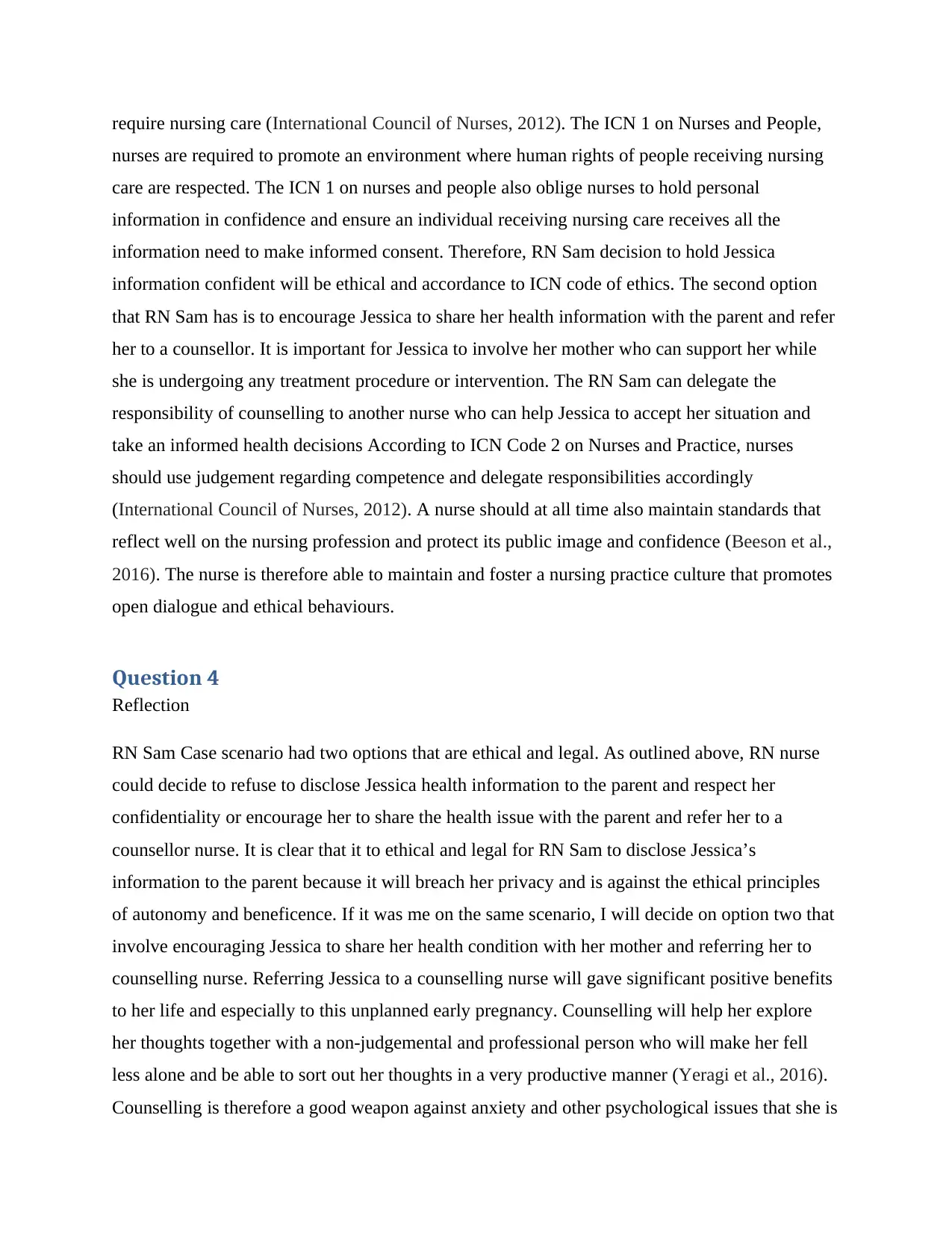
require nursing care (International Council of Nurses, 2012). The ICN 1 on Nurses and People,
nurses are required to promote an environment where human rights of people receiving nursing
care are respected. The ICN 1 on nurses and people also oblige nurses to hold personal
information in confidence and ensure an individual receiving nursing care receives all the
information need to make informed consent. Therefore, RN Sam decision to hold Jessica
information confident will be ethical and accordance to ICN code of ethics. The second option
that RN Sam has is to encourage Jessica to share her health information with the parent and refer
her to a counsellor. It is important for Jessica to involve her mother who can support her while
she is undergoing any treatment procedure or intervention. The RN Sam can delegate the
responsibility of counselling to another nurse who can help Jessica to accept her situation and
take an informed health decisions According to ICN Code 2 on Nurses and Practice, nurses
should use judgement regarding competence and delegate responsibilities accordingly
(International Council of Nurses, 2012). A nurse should at all time also maintain standards that
reflect well on the nursing profession and protect its public image and confidence (Beeson et al.,
2016). The nurse is therefore able to maintain and foster a nursing practice culture that promotes
open dialogue and ethical behaviours.
Question 4
Reflection
RN Sam Case scenario had two options that are ethical and legal. As outlined above, RN nurse
could decide to refuse to disclose Jessica health information to the parent and respect her
confidentiality or encourage her to share the health issue with the parent and refer her to a
counsellor nurse. It is clear that it to ethical and legal for RN Sam to disclose Jessica’s
information to the parent because it will breach her privacy and is against the ethical principles
of autonomy and beneficence. If it was me on the same scenario, I will decide on option two that
involve encouraging Jessica to share her health condition with her mother and referring her to
counselling nurse. Referring Jessica to a counselling nurse will gave significant positive benefits
to her life and especially to this unplanned early pregnancy. Counselling will help her explore
her thoughts together with a non-judgemental and professional person who will make her fell
less alone and be able to sort out her thoughts in a very productive manner (Yeragi et al., 2016).
Counselling is therefore a good weapon against anxiety and other psychological issues that she is
nurses are required to promote an environment where human rights of people receiving nursing
care are respected. The ICN 1 on nurses and people also oblige nurses to hold personal
information in confidence and ensure an individual receiving nursing care receives all the
information need to make informed consent. Therefore, RN Sam decision to hold Jessica
information confident will be ethical and accordance to ICN code of ethics. The second option
that RN Sam has is to encourage Jessica to share her health information with the parent and refer
her to a counsellor. It is important for Jessica to involve her mother who can support her while
she is undergoing any treatment procedure or intervention. The RN Sam can delegate the
responsibility of counselling to another nurse who can help Jessica to accept her situation and
take an informed health decisions According to ICN Code 2 on Nurses and Practice, nurses
should use judgement regarding competence and delegate responsibilities accordingly
(International Council of Nurses, 2012). A nurse should at all time also maintain standards that
reflect well on the nursing profession and protect its public image and confidence (Beeson et al.,
2016). The nurse is therefore able to maintain and foster a nursing practice culture that promotes
open dialogue and ethical behaviours.
Question 4
Reflection
RN Sam Case scenario had two options that are ethical and legal. As outlined above, RN nurse
could decide to refuse to disclose Jessica health information to the parent and respect her
confidentiality or encourage her to share the health issue with the parent and refer her to a
counsellor nurse. It is clear that it to ethical and legal for RN Sam to disclose Jessica’s
information to the parent because it will breach her privacy and is against the ethical principles
of autonomy and beneficence. If it was me on the same scenario, I will decide on option two that
involve encouraging Jessica to share her health condition with her mother and referring her to
counselling nurse. Referring Jessica to a counselling nurse will gave significant positive benefits
to her life and especially to this unplanned early pregnancy. Counselling will help her explore
her thoughts together with a non-judgemental and professional person who will make her fell
less alone and be able to sort out her thoughts in a very productive manner (Yeragi et al., 2016).
Counselling is therefore a good weapon against anxiety and other psychological issues that she is
Paraphrase This Document
Need a fresh take? Get an instant paraphrase of this document with our AI Paraphraser
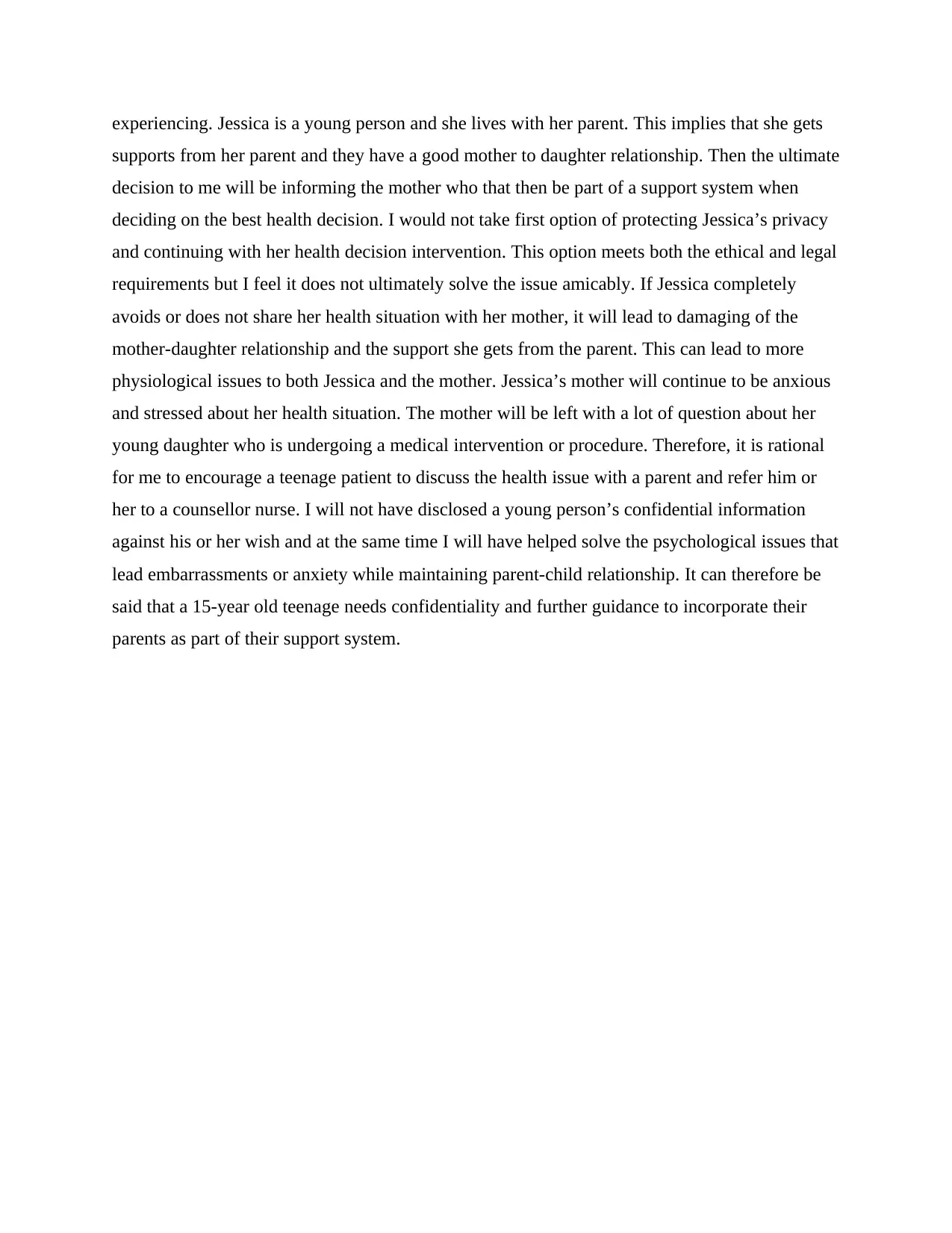
experiencing. Jessica is a young person and she lives with her parent. This implies that she gets
supports from her parent and they have a good mother to daughter relationship. Then the ultimate
decision to me will be informing the mother who that then be part of a support system when
deciding on the best health decision. I would not take first option of protecting Jessica’s privacy
and continuing with her health decision intervention. This option meets both the ethical and legal
requirements but I feel it does not ultimately solve the issue amicably. If Jessica completely
avoids or does not share her health situation with her mother, it will lead to damaging of the
mother-daughter relationship and the support she gets from the parent. This can lead to more
physiological issues to both Jessica and the mother. Jessica’s mother will continue to be anxious
and stressed about her health situation. The mother will be left with a lot of question about her
young daughter who is undergoing a medical intervention or procedure. Therefore, it is rational
for me to encourage a teenage patient to discuss the health issue with a parent and refer him or
her to a counsellor nurse. I will not have disclosed a young person’s confidential information
against his or her wish and at the same time I will have helped solve the psychological issues that
lead embarrassments or anxiety while maintaining parent-child relationship. It can therefore be
said that a 15-year old teenage needs confidentiality and further guidance to incorporate their
parents as part of their support system.
supports from her parent and they have a good mother to daughter relationship. Then the ultimate
decision to me will be informing the mother who that then be part of a support system when
deciding on the best health decision. I would not take first option of protecting Jessica’s privacy
and continuing with her health decision intervention. This option meets both the ethical and legal
requirements but I feel it does not ultimately solve the issue amicably. If Jessica completely
avoids or does not share her health situation with her mother, it will lead to damaging of the
mother-daughter relationship and the support she gets from the parent. This can lead to more
physiological issues to both Jessica and the mother. Jessica’s mother will continue to be anxious
and stressed about her health situation. The mother will be left with a lot of question about her
young daughter who is undergoing a medical intervention or procedure. Therefore, it is rational
for me to encourage a teenage patient to discuss the health issue with a parent and refer him or
her to a counsellor nurse. I will not have disclosed a young person’s confidential information
against his or her wish and at the same time I will have helped solve the psychological issues that
lead embarrassments or anxiety while maintaining parent-child relationship. It can therefore be
said that a 15-year old teenage needs confidentiality and further guidance to incorporate their
parents as part of their support system.
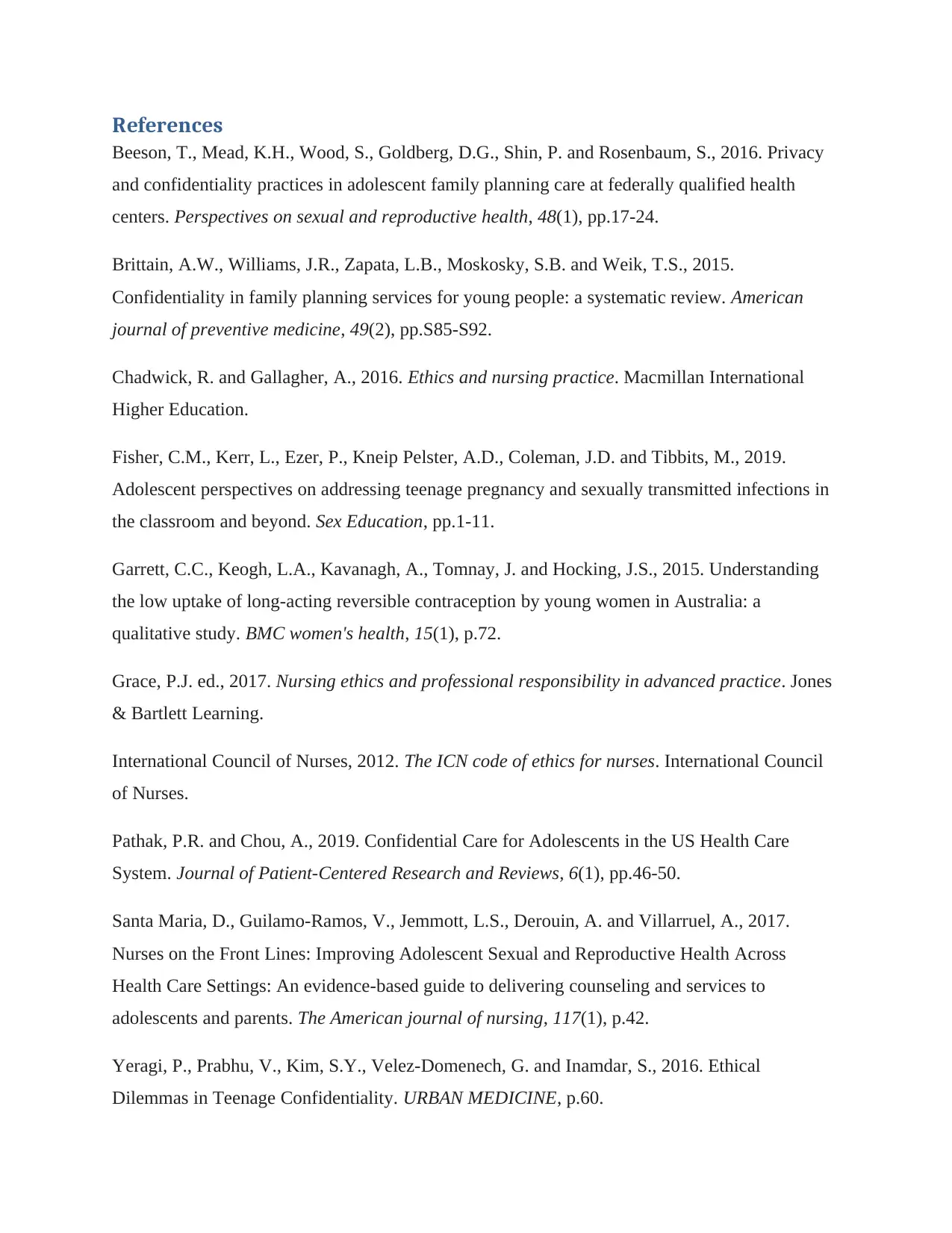
References
Beeson, T., Mead, K.H., Wood, S., Goldberg, D.G., Shin, P. and Rosenbaum, S., 2016. Privacy
and confidentiality practices in adolescent family planning care at federally qualified health
centers. Perspectives on sexual and reproductive health, 48(1), pp.17-24.
Brittain, A.W., Williams, J.R., Zapata, L.B., Moskosky, S.B. and Weik, T.S., 2015.
Confidentiality in family planning services for young people: a systematic review. American
journal of preventive medicine, 49(2), pp.S85-S92.
Chadwick, R. and Gallagher, A., 2016. Ethics and nursing practice. Macmillan International
Higher Education.
Fisher, C.M., Kerr, L., Ezer, P., Kneip Pelster, A.D., Coleman, J.D. and Tibbits, M., 2019.
Adolescent perspectives on addressing teenage pregnancy and sexually transmitted infections in
the classroom and beyond. Sex Education, pp.1-11.
Garrett, C.C., Keogh, L.A., Kavanagh, A., Tomnay, J. and Hocking, J.S., 2015. Understanding
the low uptake of long-acting reversible contraception by young women in Australia: a
qualitative study. BMC women's health, 15(1), p.72.
Grace, P.J. ed., 2017. Nursing ethics and professional responsibility in advanced practice. Jones
& Bartlett Learning.
International Council of Nurses, 2012. The ICN code of ethics for nurses. International Council
of Nurses.
Pathak, P.R. and Chou, A., 2019. Confidential Care for Adolescents in the US Health Care
System. Journal of Patient-Centered Research and Reviews, 6(1), pp.46-50.
Santa Maria, D., Guilamo-Ramos, V., Jemmott, L.S., Derouin, A. and Villarruel, A., 2017.
Nurses on the Front Lines: Improving Adolescent Sexual and Reproductive Health Across
Health Care Settings: An evidence-based guide to delivering counseling and services to
adolescents and parents. The American journal of nursing, 117(1), p.42.
Yeragi, P., Prabhu, V., Kim, S.Y., Velez-Domenech, G. and Inamdar, S., 2016. Ethical
Dilemmas in Teenage Confidentiality. URBAN MEDICINE, p.60.
Beeson, T., Mead, K.H., Wood, S., Goldberg, D.G., Shin, P. and Rosenbaum, S., 2016. Privacy
and confidentiality practices in adolescent family planning care at federally qualified health
centers. Perspectives on sexual and reproductive health, 48(1), pp.17-24.
Brittain, A.W., Williams, J.R., Zapata, L.B., Moskosky, S.B. and Weik, T.S., 2015.
Confidentiality in family planning services for young people: a systematic review. American
journal of preventive medicine, 49(2), pp.S85-S92.
Chadwick, R. and Gallagher, A., 2016. Ethics and nursing practice. Macmillan International
Higher Education.
Fisher, C.M., Kerr, L., Ezer, P., Kneip Pelster, A.D., Coleman, J.D. and Tibbits, M., 2019.
Adolescent perspectives on addressing teenage pregnancy and sexually transmitted infections in
the classroom and beyond. Sex Education, pp.1-11.
Garrett, C.C., Keogh, L.A., Kavanagh, A., Tomnay, J. and Hocking, J.S., 2015. Understanding
the low uptake of long-acting reversible contraception by young women in Australia: a
qualitative study. BMC women's health, 15(1), p.72.
Grace, P.J. ed., 2017. Nursing ethics and professional responsibility in advanced practice. Jones
& Bartlett Learning.
International Council of Nurses, 2012. The ICN code of ethics for nurses. International Council
of Nurses.
Pathak, P.R. and Chou, A., 2019. Confidential Care for Adolescents in the US Health Care
System. Journal of Patient-Centered Research and Reviews, 6(1), pp.46-50.
Santa Maria, D., Guilamo-Ramos, V., Jemmott, L.S., Derouin, A. and Villarruel, A., 2017.
Nurses on the Front Lines: Improving Adolescent Sexual and Reproductive Health Across
Health Care Settings: An evidence-based guide to delivering counseling and services to
adolescents and parents. The American journal of nursing, 117(1), p.42.
Yeragi, P., Prabhu, V., Kim, S.Y., Velez-Domenech, G. and Inamdar, S., 2016. Ethical
Dilemmas in Teenage Confidentiality. URBAN MEDICINE, p.60.
⊘ This is a preview!⊘
Do you want full access?
Subscribe today to unlock all pages.

Trusted by 1+ million students worldwide
1 out of 6
Related Documents
Your All-in-One AI-Powered Toolkit for Academic Success.
+13062052269
info@desklib.com
Available 24*7 on WhatsApp / Email
![[object Object]](/_next/static/media/star-bottom.7253800d.svg)
Unlock your academic potential
Copyright © 2020–2026 A2Z Services. All Rights Reserved. Developed and managed by ZUCOL.




